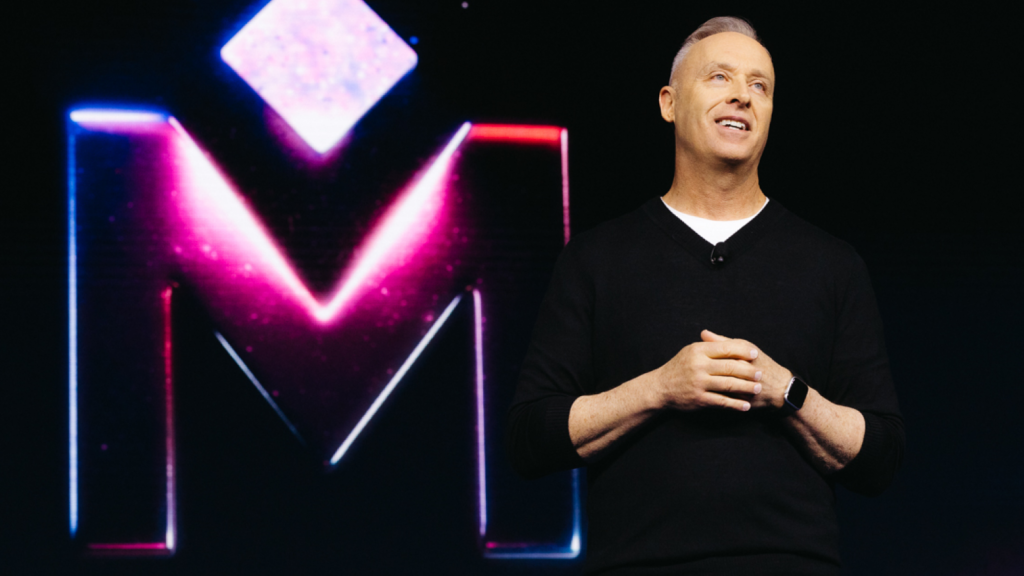New Trends in CX and AI: What We Learned from Experience ’24
March 27, 2024
Customer Experience
Discover the top CX and AI use cases, benefits, and best practices, according to the latest research and top CX practitioners from leading brands
At Experience ’24, we brought together the world’s leading experience professionals to discuss the latest trends and advances in our field, the rising prominence of generative artificial intelligence (gen AI), the impact of automation, and the increasing importance of personalization. It’s clear that gen AI and other artificial intelligence (AI) are critical, omnipresent forces that are shaping interactions across channels and touchpoints. We heard from real-world customer experience (CX) leaders from UBS, Volvo, and Walgreens about how the acceleration of AI within our industry is unfolding and what organizations need to consider when adopting AI technologies to power their CX strategies.
A clear takeaway is that for long-term success, having the right people, practices, and (responsible, trusted) systems in place will be vital to (survive and) thrive in this new landscape. Let’s dive into some of our most important learnings from the week related to using AI in customer experience.
2024 Trends in CX and AI
Top 4 CX and AI Key Use Cases in 2024
Medallia’s time-tested foundational AI capabilities, which have been around for 15 years, and latest AI breakthrough technologies have been thoughtfully developed to help CX practitioners accomplish four impactful uses cases, translating data into meaningful, actionable insights; enabling more efficient customer interactions; empowering employee productivity through tailored training; and guiding nest best actions for customers and the business.
1. Using AI to improve the quality of data analysis.
Ask Athena, one of Medallia’s new AI innovations, is designed to help brands get more value and insights out of their customer experience data. This AI assistant uses large language models to answer any question related to your customer data on the spot, providing instant data analysis in the form of a summary, graph, chart, or other module, without employees having to spend hours digging into reports and dashboards for answers.
2. Using AI to accelerate the speed of data analysis.
Medallia’s Themes feature will use generative AI to surface more granular emerging trends in an instant, helping employees save time on root-cause analysis to pinpoint important trends, elevate them to a topic if needed, and empower teams to quickly track and trend them to investigate how and why KPIs are changing.
3. Using AI for content generation for customer communications.
By using AI solutions like Medallia’s new Smart Response, teams can scale the power and productivity of their people across contact center, customer experience, and employee experience teams. Smart Response automatically generates personalized, empathetic, and accurate responses to a customer feedback record that employees can review and modify before sending as a reply, helping increase personalization while also saving time on writing responses.
4. Using gen AI to create concise, relevant summaries of conversational data.
Medallia’s Intelligent Summaries saves employees thousands of hours of time with AI composed summaries that instantly recap any customer interaction providing details, such as reason for contact, issue resolution information, and the content of the conversation, increasing consistency across millions of records so users can spend less time scrolling through interactions to find the right insights.
CX and AI Benefits for Organizations

At Experience ’24 Medallia’s Senior Vice President and Executive Advisor, Bill Staikos, moderated an exciting panel about the future of CX with Ginny Couvillon, Head of Client Services, US Wealth Management, at UBS; Astrid Kowalczyk, Global Head of Customer Experience Insights and Analytics at Volvo Cars; and Tracey Brown, EVP and Chief Customer Officer at Walgreens. They discussed how they’re using AI now and how they are thinking about its application going forward. Here are some of the top use cases they discussed:
1. Making things easier for employees
At Volvo, customers value human interactions, and Kowalczyk explained that she sees the value of AI not in replacing these human interactions with knowledgeable retailers with bot-driven experiences but instead in using AI to increase efficiencies and standard knowledge among staff who interact with customers.
That’s the potential Couvillon at UBS said she sees as well. She said she thinks of AI as “the great assist” or “the great accelerator” for financial advisors, enabling them to be more effective and efficient in their roles. One area they’re using AI is in synthesizing the company’s proprietary research around market data, risk data, and personal risk appetite for financial advisors so they can “ultimately make better decisions for the client and deliver that insight to clients.” She said she sees a huge opportunity in taking all of the company’s training and process documents and FAQs and using AI to make this content more “snackable” for employees for learning purposes.
2. Improving the customer experience
For Walgreens, Brown and her team are thinking of ways to use AI that add value for customers — specifically to address points of friction in the customer journey. The company has identified four areas where friction can occur — when customers come to visit, navigate, check out, and receive products or services — and, according to Walgreens research, what their customers want to happen during these interactions is to be able to save time and money; receive insights, products, and services to feel smarter and feel better; and be recognized and treated as an individual by the brand. In addition, Walgreens research indicates that customers want clean stores, fast and friendly service, stocked shelves, and the ability to get their prescriptions quickly and accurately. As such, the brand is using AI and technology across these areas to create a better experience. They’ve started by partnering with Medallia and building these drivers of excellence into their reporting within Medallia, so they can instantly analyze how each one of their 9,000 stores is performing across these factors.
3. Delivering personalization
Walgreens has over 100 million customers in their database, and Brown said the retailer is using AI to predict what these individuals need to serve up the right experiences at the right time for the right individuals.
4. Increasing operational efficiency and driving cost savings
Brown explained that there are plenty of opportunities to use AI to add value across the retail ecosystem, from merchandising and operations to product development, marketing, and supply chain management.
One of the ways Walgreens is using AI to drive operational efficiencies and cost savings is by combining external data sources, such as weather and event data localized to each of the company’s retail stores, along with customer data, including in-store visit data and health and wellness data, for demand forecasting to help the company prevent out-of-stock issues and to manage inventory levels so that only what’s needed is kept on hand. “These kinds of things have allowed us to reduce out of stocks for the customer by 15% and reduce inventory by 5%,” said Brown.
CX and AI Best Practices: Using Artificial Intelligence the Right Way
Brands that use artificial intelligence the right way adopt a people-first, platform-second approach, explained Couvillon. They’re not investing in AI for technology’s sake, but to solve real customer and employee challenges using AI responsibly and ethically.
Establish internal guidelines for using AI
Volvo has established an AI committee responsible for determining the AI principles for the brand and this is a must-have for using AI the right way, according to Kowalczyk.
These types of guidelines should set parameters for using AI responsibly, from a privacy, compliance, sharing, and transparency perspective, added Brown.
Prioritize data quality
Organizations need to bring together all of their data from across sources — from in person interactions to digital touchpoints — and structure it in a way that can be used by AI, said Kowalczyk.
As Medallia’s CEO Joe Tyrrell explained in his keynote, the insights you unlock from AI “will only be as good as the data that it can access.”
Choose technology partners that focus on data security and trust
Medallia’s Director of Service Operations and Security, Scott Gorman, a member of Medallia’s AI Moderation Council, recently wrote about how AI security needs to be a priority for experience programs, and how “security considerations are — and will always be — foundational to how we design and implement AI models.”
In his article, he explained that brands can mitigate against any potential risks associated with AI by choosing partners that are actively building their platforms with the latest legal, data security, and compliance standards, regulations, and concerns in mind. You can read more about Medallia’s approach to building a robust, secure foundation for AI into our experience platform in Gorman’s blog here.
In her Experience ’24 keynote, Simonetta Turek explored how Medallia is building “trust into every experience.” We focus on trust so our customers can rest assured that “as we incorporate new AI technologies, we are protecting your data, security and privacy,” she added.
That’s why we created an AI Moderation Council, consisting of members from our legal, privacy and security, compliance, product and engineering, and customer organizations, to provide oversight, guidance, and policy as it relates to AI. The goal of this group, Turek explained is “to ensure that, for example, we think about data controls so that we respect security and data access policies, and that we eliminate hallucinations, and filter for bias, and toxicity in our AI models.”
As part of her presentation, she also announced the launch of an AI Advisory Board at Medallia that will consist of customer and partner members focused on the responsible and ethical use of AI.
Leverage the best of human intelligence and artificial intelligence
There was one consistent theme among Experience ‘24 discussions of using AI for CX: AI shouldn’t be used to replace high-value human interactions.
After all, as Hadley Spadaccini, Senior Product Marketing Manager at Medallia, described in her keynote, “Artificial intelligence can’t replace the human touch, but working alongside AI, humans can do what they do best — connect.”
Final Thoughts
At Medallia, we’re focused on bringing responsible AI solutions that enable companies to unleash new levels of personalization and productivity for employees that drive efficiency, cost savings, and sustainable growth for organizations. As brands decide when and how to use AI for understanding and enhancing experiences, it’s essential they do so with great thought.
As Turek said in her keynote, “enduring success will be enjoyed by those who adopt responsible AI proactively, rather than reactively.”
To learn more about how Medallia is approaching CX and AI and our latest AI breakthroughs, check out our Experience ’24 Keynote: Redefining the Possible in Generative AI and Personalization.






